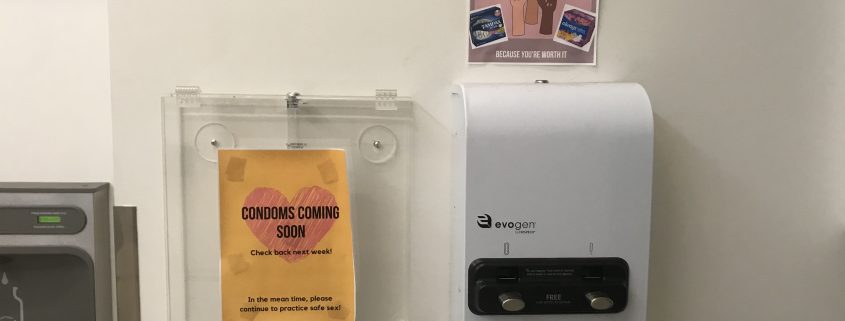Residential Education pilots free feminine hygiene program

(Mia Speier | Daily Trojan)
USC Residential Education announced at the beginning of this semester that it will offer bins of free feminine hygiene products in residential colleges. The program, which is currently being piloted at Cowlings and Ilium Residential College, began at the start of the semester.
Since a free condom initiative 8 for residential colleges received positive feedback from students, resident assistants and members of Residential Education proposed providing feminine hygiene products for free in residence halls.
“I felt like this would be implemented because if we are giving away free condoms, why not feminine products?” said Cowlings and Ilium resident assistant Emily Mota.
Residential Education, in partnership with the Office for Health Promotion Strategy, has supplied condom buckets to resident assistants. This program, which is in its second year, influenced the creation of a free feminine hygiene product pilot.
Poori Jareankitja, a sophomore majoring in business administration, said the program will allow students to have access to feminine hygiene products regardless of cost.
“Pads and tampons are really expensive, and a lot of people don’t view it as a necessity even though it should be,” Jareankitja said. “I think that would be a huge weight lifted off of the women students here.”
Standard-size feminine products at retail stores near campus, such as the Target at USC Village, cost anywhere between $3 and $10. Mota said these prices are steep for students who struggle financially.
The pilot has been met with enthusiasm by students, and it is still in the process of being implemented in more residential colleges on campus.
“In terms of free feminine hygiene products, I am aware that conversations are happening on a larger scale, but I have not heard the final decision,” Sandoval said.
The free condom initiative, which is similar to the feminine hygiene product pilot, has been successful in providing free and accessible resources for students.
“I think it’s going to be less of a hassle for students to get condoms and may eliminate the financial burden that some students face buying contraception,” said Ethan Saber, a sophomore majoring in political science. “I hope it leads to safer sex.”
Jade Crenian, a sophomore majoring in law, history and culture, said the success of the condom program can help influence the feminine hygiene one.
“I’m totally for it,” Crenian said. “I think they should absolutely put period products into residence halls. They do it with condoms, so why not? It would just make everyone’s life probably easier.”
Many female students feel strongly about the pilot program and hope that it will expand to other residential colleges soon.
“I think it’s really good, as long as they are sanitary … a lot of the times when you go out to restaurants and you try to get those 25-cent ones, nobody has coins, ever, so you have to end up asking people for it,” said Sunvriti Khanna, a sophomore majoring in communication.
While Jareankitja believes that the pilot could be helpful, he acknowledges that the steep cost of feminine products will incentivize people to take advantage of the free pilot program. He believes this may lead to some complications with resource availability.
“I think it would be costly, I feel like people would have stock pile on it,” he said. “Maybe supply would be limited to only a few people. So maybe a better distribution system, like someone has to monitor it.”
The discussion about providing students with free resources has led students and resident assistants to suggest more products, such as toilet paper, be made available to students.
“I definitely hope that this would lead to just more resources being given here at USC,” Mota said. “I know they have a vending machine in the Starbucks area at Café 84 with cheaper alternatives for Plan B and other stuff like that. Maybe having more of that, just creating a space where students can not have to worry about basics.”

